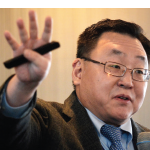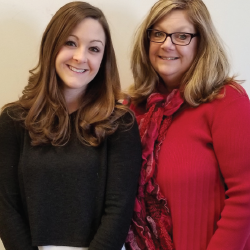SEATTLE—At the first regional vasculitis patient conference ever held in the Pacific Northwest, a panoramic view of Mt. Rainier on a clear January morning set the tone for a day of optimistic talks about recent successes against the various forms of blood vessel inflammation. One attendee at the Jan. 12 conference, sponsored by the Vasculitis Foundation in partnership with the University of Washington’s Division of Rheumatology, noted it was hard to tell patients from caregivers among the 100-plus participants—a definite sign of progress.
The success of recently approved treatments, such as the monoclonal antibodies rituximab (Rituxan) and mepolizumab (Nucala), and encouraging trial results of drug candidates, such as Avacopan (CCX168), have provided ample reasons for optimism. “The future is bright, I think, for vasculitis in general,” said Gregory C. Gardner, MD, FACP, Gilliland-Henderson Professor in Rheumatology at the University of Washington.

Dr. Seo
Featured speaker Philip Seo, MD, MHS, associate professor of medicine and director of the Johns Hopkins Vasculitis Center in Baltimore (and physician editor of The Rheumatologist [TR]), said some newer drugs may even become, “The Tina Feys of vasculitis,” a cheeky reference to the highly successful former cast member of Saturday Night Live.
Nevertheless, the humor and sunshine were tempered by more sobering stories of patients struggling to reclaim their lives after lengthy medical odysseys. Throughout the day, audience members shared tales of having to shop around for doctors, not having their symptoms taken seriously, lacking patient advocates, having to navigate a bewildering healthcare system alone, waiting years to receive the correct diagnosis, and even being forced to use spreadsheets to manage their own complex care.
Some came to the conference, one of more than 15 now held by the Vasculitis Foundation, to network and find mutual support. Some came to hear specific talks and solicit advice about their symptoms and care. And some came to deliver the message to rheumatologists that far more is needed to help support patients through what can still be an arduous and life-threatening ordeal. Just as attendees learned from the rheumatologists, the doctors received a firsthand look at patients’ main concerns.
In Search of Support & Community

Kami Schmidt with her daughter, Haley (left), who helped her start the support group.
Kami Schmidt, an attendee from Pine City, Minn., believes she’s had microscopic polyangiitis (MPA) for years. She remembers getting pneumonia nearly every fall, like clockwork, and experiencing frequent sinus issues. Her doctors always just knocked the infections back with prednisone—one reason she believes she wasn’t diagnosed sooner. “There does need to be more awareness,” she said in an interview with TR.
After nearly dying in 2009, Ms. Schmidt was finally diagnosed via a bronchoscopy and kidney biopsy and treated with intravenous prednisone, cyclophosphamide and plasmapheresis. “I told my doctor, ‘If I live through this, I want to do something to help other people going through this,’” recalled Ms. Schmidt.
Even though a team of seven doctors was caring for her at the time, Ms. Schmidt lacked a patient advocate or go-to person to ask her many questions. She decided to launch a support group “so people aren’t alone” and formed the East Central Minnesota Vasculitis Support Group, which regularly attracts more than 30 people to its quarterly meetings.
Ms. Schmidt traveled to the conference to report back to her group on the latest studies and treatment options. “I’m happy to see that there’s a lot of research,” she said. She also had high praise for the conference’s emphasis on education, empowerment and networking. “I think it’s great they connect people with vasculitis—people yearn for this. To have all of these people together, it’s amazing,” she said, looking around the room.
Sitting at the same table, Rosemary Brechtelsbauer told TR that she came to the conference from a nearby suburb to hear about new drug trials targeting her own rare condition, eosinophilic granulomatosis with polyangiitis (EGPA), as well as other forms of vasculitis. “I like to know everything,” she said. “I want to know what’s going on.”


